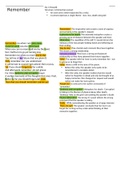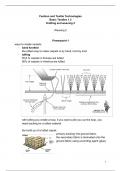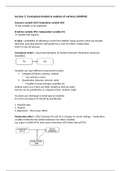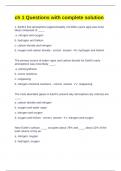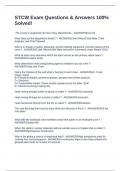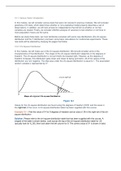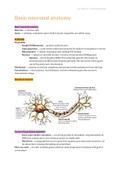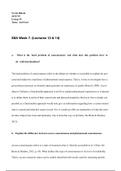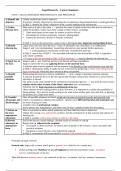Remember Structure: A Petrarchan sonnet
An octet and a sestet separated by a volta.
A sonnet expresses a single theme - love, loss, death and grief.
'Remember': The imperative verb creates a tone of urgency
and certainty in the speaker's request.
Euphemisms for death: The extended metaphor creates a
growing sense of distance between the speaker and lover.
Alliteration: The repetition of the soft 'h' sound mirrors the
Remember me when I am gone away, intimacy of the two people holding hands and reflecting on
Gone far away into the silent land; their ending.
When you can no more hold me by the hand, 'Day by day': They cherish each moment they have together.
This shows a strong relationship.
Nor I half turn to go yet turning stay.
Inclusive pronoun: They have a strong and balanced
Remember me when no more day by day
relationship as they have planned their future together.
You tell me of our future that you plann'd: 'Only': The speaker tells her lover to only remember her - not
Only remember me; you understand to grieve or to forget her.
It will be late to counsel (get advice) then or pray. Volta: Shows a shift in the tone of the poem.
Yet if you should forget me for a while Before the volta, the speaker only wants to be
And afterwards remember, do not grieve: remembered in complete detail.
For if the darkness and corruption leave After the volta, the speaker realises that she would
A vestige (remnant) of the thoughts that once I had, rather be forgotten in detail and only be thought of as
Better by far you should forget and smile happy memories. She changes her request and would
Than that you should remember and be sad. rather not make her lover grieve.
'Forget me': A contrast to her earlier commands of
'remember'.
'Darkness and corruption': Metaphors for death. 'Corruption'
is linking to the illusion of physical decay after death.
'Darkness' links to the grief surrounding the speaker’s death.
Plosive Alliteration: The strong 'b' sound reflects the strong
command that the speaker is asking.
'Smile': While remembering the speaker as a happy memory.
'Than…be sad': The speaker concludes that her lover can
forget her as long as they smile while thinking of their
memories together.
,The Zulu Girl 'Hot red acres': The setting is described as an oppressive
working environment.
'Gang': implies violence and dangerous connotations towards
By: Roy Campbell the Zulu people.
Title: 'Girl' refers to the mother as a young 'Flings and tormented': Create a tone of helplessness and stress
child. This creates a demeaning and belittling within the characters.
image of the mother. Internal rhyme: Creates a sense of carelessness and frustration
Throughout the poem, incongruent amongst the characters.
images of strength and inferiority of the
workers and the mother are created. 'Shadow' Metaphor: Her only relief is miniscule and not fully
restorative in the intense heat. The shadow is not even a
proper area of shade and the combination of several dappled
trees’ shadows.
'Blood of ticks': The primal aspects of life are described. She has
When in the sun the hot red acres smoulder,
to deal with the unpleasant aspects of life in order to protect
Down where the sweating gang its labour plies, her baby.
A girl flings down her hoe, and from her shoulder 'Prowl': Animal imagery is created of the mother.
Unslings her child tormented by the flies. Alliteration: Just as the sibilance creates a short, sharp sound
when read, so too does it reflect the roughness and sharp
She takes him to a ring of shadow pooled movements with which she removes ticks.
By thorn-trees: purpled with the blood of ticks,
While her sharp nails, in slow caresses ruled, Alliteration and assonance: Just as the 'g' and 'u' sounds are
Prowl through his hair with sharp electric clicks, soft and deep when read, so too does this reflect the intimate
sound of the baby feeding.
His sleepy mouth, plugged by the heavy nipple, Simile: Animal imagery of the baby drinking
'Languors': (A pleasurable tiredness) The baby's nerves are
Tugs like a puppy, grunting as he feeds:
soothed by the mother's milk.
Through his frail nerves her own deep languors Simile: The mother's milk is compared to a gentle river flowing.
ripple 'Sighing': Just as the river gently flows through the
Like a broad river sighing through its reeds. environment, so too is the baby calming down. His entire body
is consumed by drowsiness and appears as if he is 'sighing'.
Yet in that drowsy stream (of milk) his flesh (also)
imbibes (absorbs) Volta: A change from the intimate imagery to a larger societal
(along with the milk) An old unquenched image being described.
unsmotherable heat — 'Heat': A metaphor for ancient power. Zulu history remains
The curbed ferocity of beaten tribes, unsatisfied, and their spirit cannot be dampened as a result of
The sullen dignity of their defeat. colonisation.
The baby takes in this power and unrest of his beaten
ancestors through his mother's milk.
Her body looms above him like a hill 'Sullen dignity': Although the Zulu people have been beaten,
Within whose shade a village lies at rest, they are still noble and deserve respect as they still have a
Or the first cloud so terrible and still passion within them.
That bears the coming harvest in its breast.
Simile: Just as a hill overlooks and shelters a village so to does
the mother cover and protect her baby as she leans over him.
Despite her hard conditions, she is still providing for her
Idea of the shade: African traditions believe baby, which shows her strength and resilience.
the ancestors strongly affect daily lives. Her 'Shade': Unlike the 'shadowed pool' of the trees, the mother is
'shade' over a whole village represents how able to provide proper protection in the form of a cooling
she will protect and direct future generations shadow.
just as shade guides and protects people who Metaphor: The baby is represented by a village as he contains
live in the village. his people's passion and history within him. Just as the
mountain protects a village, so too does the mother protect her
baby and the culture passed down to him.
'First cloud' and 'coming harvest': Within the mother and baby,
there is hopefulness for a prosperous future.
A whole community has hope for the future as a result of
the Zulu Girl's actions
, Stanza 1: The speaker's immediate surroundings are
Funeral Blues described, and he calls for them to be in mourning and
respect his mourning. He wants the world to stop around
him and for only the coffin to be bought in and for the
By: WH Auden funeral to begin.
Title: The word 'blues' sets a somber tone. Imperative tone: A imperative tone is used to create a sense
of desperation and to show the importance of the funeral.
'Clocks': Clocks must stop because in the speaker's
understanding, time has stopped for him.
'Telephone': The telephone must be cut off because he
wants no further communication with people.
'Dogs': Dogs represent a playful and fun nature and the
speaker feel the opposite to this.
Stanza 2: The speaker calls for the whole world to mourn
and respect the death of the speaker’s lover to reflect his
own feelings of grief.
Stop all the clocks, cut off the telephone,
'Moaning': Personification and onomatopoeia of the planes
Prevent the dog from barking with a juicy bone, actively showing their grief.
Silence the pianos and with muffled drum 'Scribbling': Nothing matters to the speaker anymore and so
Bring out the coffin, let the mourners come. he takes no care when writing.
'He is Dead': The capital letters create the sense of a
Let aeroplanes circle moaning overhead newspaper headline. The speaker wants the whole world to
Scribbling on the sky the message ‘He is Dead’. know about his lover's death.
Put crepe bows round the white necks of the 'Scribbling' vs. 'He is Dead': There is a contrast
public doves, between the haste and informality of the writing with
Let the traffic policemen wear black cotton the headline-style message that the planes must
write.
gloves.
'Bows' and 'Gloves': The speaker calls for figures of the
public to adopt traditional mourning symbols to show their
He was my North, my South, my East and West, respect and grief.
My working week and my Sunday rest,
My noon, my midnight, my talk, my song; Stanza 3: The relationship of the speaker with his lover.
I thought that love would last forever: I was Directions, days, time and actions: The speaker describes his
wrong. lover as being his everything and provides him with
direction (NESW) and consistency (time)
The stars are not wanted now; put out every Personal pronoun: Makes the poem more personal to the
one, reader and shows that it is a serious personal reflection
Pack up the moon and dismantle the sun, within the speaker.
Pour away the ocean and sweep up the wood; 'Thought': A sense of disillusionment within the speaker is
created when his romantic illusions of life are replaced with
For nothing now can ever come to any good.
the harshness of reality.
Caesura: A pause is created which emphasizes the speaker’s
disillusionment over the reality of love. It creates a moment
of reflection in the reader over the speakers’ beliefs about
The effects of the hyperbole on the love.
meaning:
Creates a sense of totality and the Stanza 4:
intensity of his grief being all Caesura: Used to emphasize that the funeral he wanted in
consuming. the first stanza is no longer sufficient to represent his loss
Creates a sense of lightness due to and that his grief can only be objectified by altering the
the gross exaggeration. Shows the universe.
loving and fun side of their 'Moon' and 'sun': Nature's beauty can no longer be
relationship. appreciated after his loss. He lost the "center and sun" of
his universe when he lost his lover and so the stars and sun
must be removed so as to not remind him of his loss.
'Nothing…good': The speaker describes his sorrow and
despair by explaining that can never feel hopeful about life
ever again.

